Peter MALONE
Saturday, 18 September 2021 19:30
Hunter, The
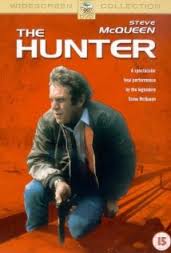
THE HUNTER
US, 1980, 98 minutes, Colour.
Steve Mc Queen, Kathryn Harrold, Eli Wallach, Ben Johnson.
Directed by Buzz Kulik.
The Hunter is familiar Steve Mc Queen material (Bullitt etc.) and is again the reminder that contemporary American justice, violence (and even a bounty hunter) derive from the frontier and the west. Here Mc Queen is genially and credibly ageing, good at his job (though for fun this time he is an awkward driver). Pregnant Kathryn Harrold is a strong leading lady and characters are well drawn. The pace is crackling, almost breathless - an action climax every ten minutes or so to Michel Legrand's thumping score: harvesters, car chases, Chicago subways and car parks, exploding classrooms. Mc Queen's hunter is a return to the tough, humane American hero (with touches of humour and fallibility).
1. The police film of the '70s and '80s? The tradition of the American western? The film's comment on its plot and characters being in the tradition of the west? The bounty hunters? The action, heroes, villains? Violence? The continuation of the frontier tradition?
2. The film as a Steve Mc Queen vehicle? His last film? His personality, style, ease of manner, laconic way of speaking? An American screen hero?
3. The cross-section of American locations? Californian background, the mid-west, Chicago? Colour photography? The importance of the special effects especially for action sequences: the harvester, the chases, the classroom explosion, the trains and buildings in Chicago? The importance of the editing and pace? The melodramatic music and its tone?
4. The film based on a true story? How authentic did it seem? The explanation of the law about bounty hunters? The significance of the prologue? The importance of bounty hunters and bail bonds for American justice? Sheriffs, bail bondsmen? The carrying on of traditions from the frontier?
5. The importance of Ben Johnson's guest appearance as the sheriff and his comments about Papa Thorson and the west? Thorson's reaction to this? His assessment of his role as bounty hunter?
6. The particular styles of the tough American hero: strength, wariness, tricks, guns, eluding pursuit? The particular technical details, the use of technology? Thorson's distrust of modern methods? His yearning for the old? The blending in of the humane touch, vulnerability?
7. The film and its relationship to television methods: the episodes of the plot, frequent climaxes and excitement? The music to signal the climaxes?
8. The portrait of Ralph Thorson: an authentic character of police work, the introduction to his work and his technique of trapping Tommy Price? His relationship with Dotty, his unwillingness for her to be pregnant? Their comfortable life together? So many years? His friendship with Ritchie Blumenthal? Discussions about jobs? The amount of travel? The encounter with the sheriff and the capturing of Face? The episode getting the brothers in Nebraska and the pursuit with the harvester? The threats in California, especially from ROCCO? The humorous deal with Winston Blue and Thorson getting rid of the police and taking him in? The impact of the Chicago chase sequences? The siege in the schoolroom and the explosion? The contrast with Dotty's anxiety, wanting to leave. the exercises for natural childbirth and Thorson's wariness of them? Driving her to the hospital - and the humour of his fainting? The range of his friends, ex-criminals and their being at home playing cards in his house, Tommy Price and his working for him - and his being bashed? A rounded character -likable, American strength?
9. The picture of Thorson's household? The ease of the people there, of Tommy Price feeling at home? Protection of Dotty? His being bashed and Dotty kidnapped?
10. The love for Dotty, her schoolwork, a heroine for this kind of film, the threats of Rocco? The siege? The pregnancy classes and the birth?
11. Blumenthal and his work, the discussions with Ritchie, persuasion?
12. Winston Blue - his background, deal with Thorson, the police siege, arrest?
13. Rocco and his continued menace, the bashings, the warnings, the kidnapping of Dotty, the long sequence in the school and Thorson's device of exploding the classroom?
14. The background of Thorson's friendship with Spota? His apprehensions about him? His being on the take, the stealing of the drugs? Their long discussion together and getting drunk? The other side of police pressure and being in the public eye? The pathos of his suicide?
15. How satisfying an addition to the police genre of the '70s? The importance of its link with the background of the western?
Published in Movie Reviews
Published in
Movie Reviews
Tagged under
Saturday, 18 September 2021 19:30
Hunted

HUNTED
UK, 1952, 84 minutes, Black and white.
Dirk Bogarde, Jon Whitely, Kay Walsh, Elizabeth Sellars, Frederick Piper, Geoffrey Keen, Julian Somers.
Directed by Charles Crichton.
Hunted is a brief thriller of the '50s, effectively directed by Charles Crichton who made a number of films for Ealing Studios. It features the young Dirk Bogarde as well as Jon Whitely, who made such an impact as one of the Kidnappers. There is an excellent supporting cast which includes Elizabeth Sellars, Kay Walsh, Geoffrey Keen. Authentic locations are used. The film, though brief, has good characterisations and draws well the bond between the hunted killer and the little boy running away from home.
1. Interesting and effective small thriller? A film of the '50s?
2. Black and white photography, locations and their authenticity? The mood and pace of the film? Musical score?
3. The situation of Chris and Robbie? Chris's quilt or innocence? A man on the outer, the sailor, the chase? The little boy running away from home? Guilt about setting fire to the house? The bonds between the two? The love each for each? Chris giving his life for Robbie?
4. Chris, the fight, the man's death? The meeting with Robbie? On the run, hiding, the need for money, Robbie going into the house but failing to get the money, Chris and his wife and her affair? The escape from the city, getting lifts along the road? The boarding house and their plans? The suspicions of the wife? Robbie, caring for him, the food? The impact on him? Chris's moods ~ wanting to get rid of the boy, helping him? The mutual dependence? The running away from the house after the discovery of the truth? Crossing the train tracks, travelling by night, aiming for the mountains? Hunger? The farm? The contact with Chris's brother, going to the house, his rejection? The boat, the escape? Robbie sick, the brevity of Chris bringing him back and the end of the film? Leaving it to audience imagination? Dirk Bogarde's portrait of Chris?
5. Robbie and his parents, the orphan, playing with matches, the fire, running away? The gradual revelation of his foster parents' cruelty, the marks on his back, his fear? The chance encounter with Chris? Going with him, his fears about the fire? Avoiding the police? Going into the house to get the money? The perspective of the little boy? On the run, the lifts, at the boarding house and the kindness of the wife? The leaving of the house, running away, into the mountains? Chris's moods and Robbie always coming back? On the boat, his sickness? A good portrait of a little boy?
6. The sketch of the police, investigations, pursuit?
7. Chris's brother, the phone contact, his respectability in the village, his rejection of his brother, Chris's reaction?
8. The boarding house, the kindly woman, coping with the truth about Chris, the
newspaper, her husband?
9. Chris's wife, the affair, her fear?
10. Robbie's parents, seeming ordinary, their concern, the gradual revelation of their harshness and cruelty?
Published in Movie Reviews
Published in
Movie Reviews
Tagged under
Saturday, 18 September 2021 19:30
Hunchback of Notre Dame, The/ 1982
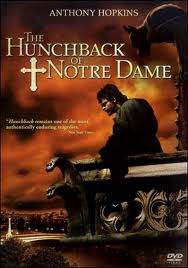
THE HUNCHBACK OF NOTRE DAME
US, 1982, 97 minutes, Colour.
Anthony Hopkins, Lesley Anne Down, Robert Powell, Derek Jacobi, John Gielgud, David Suchet, Nigel Hawthorne, Tim Piggot-Smith?.
Directed by Michael Tuchner.
The Hunchback of Notre Dame is a lavish television remake of a film of the Victor Hugo story which has served as a vehicle for Lon Chaney, Charles Laughton, Anthony Quinn. Here Anthony Hopkins tries his hand as Quasimodo - quite effectively (with echoes, later in the film, of The Elephant Man, a film in which Hopkins starred). The attractive Lesley Anne Down is Esmeralda. There are good supporting performances, especially by Derek Jacobi in the Cedric Hardwicke role as the Archdeacon of the cathedral. Robert Powell is Phoebus and John Gielgud the torturer. Sets and decor are attractive - it would seem that the film has a large budget. Direction is by Michael Tuchner, director of films like Villain, Fear is the Key, Mr Quilp and telemovies as The Summer of My German Soldier. A good version of the story.
1. The continued appeal of Victor Hugo's novel? The characters, the plot, the themes?
2. Comparisons with previous versions? Treatment, characterisation, style?
3. The impact of the television style for this film? Adaptation for television audiences? Production values: sets. costumes and decor? The quality of the cast?
4. The screenplay and the initial focus on Esmeralda, the emphasis on Quasimodo later in the film? The importance of the structure of the story - the contrast between Esmeralda and Quasimodo. their similar experiences. the role of the Archdeacon towards each? The interplay of these themes for drama?
5. The prologue with the birth of Quasimodo the baptism by the Archdeacon - and its irony? The Archdeacon baptising Quasimodo and naming him 'almost a man'? Esmeralda's later response to the Archdeacon. response to Quasimodo? Quasimodo killing him?
6. The atmosphere of Paris, the Middle Ages? The authority of the King. the response of the people, the crowds. the world of the thieves and beggars, the clergy. the military? The background of social uprising and repression?
7. Quasimodo and audience sympathy for him? Anthony Hopkins' skill and voice? The effectiveness of the make-up? For horror and shock? Quasimodo in the cathedral, his age? Deafness from the bells? His first appearance and the choice for the King of the Fools, his coronation? His doing the Archdeacon's will. capturing Esmeralda? His being taken, the trial, put in the stocks, whipped? His plea for water? The Archdeacon's cruelty? Esmeralda's response? His seeing Esmeralda about to be executed, taking her and giving her sanctuary? The revelation that the man could speak, had intelligence? Audience sympathy for the gentleness of Quasimodo? His care for Esmeralda, talking to her, explaining things to her, not wanting to frighten her, defending her? The siege of the cathedral and his rebuffing it? His reaction to the Archdeacon's treatment of Esmeralda, killing him? His being the victim of the crowd, his hanging on the gargoyle, his death? The portrait of Nature's victim, the human victim? The Christ-figure aspects of the Hunchback of Notre Dame?
8. Esmeralda and her beauty, one of the gypsies, her dancing, the arrest, the Archdeacon's infatuation and setting her free? The king of the thieves and his knowing this? Esmeralda's attraction towards Phoebus? Her romantic vision of him? The rendezvous? His seeming death and Esmeralda's arrest? The ordeal, the trial, the torture? Her about to be executed. the rescue? The initial approaches of the Archdeacon to house her in the cathedral, his advances, would-be seduction? The temptation to save her, his letting her die? The poet and his love for Esmeralda, her rescuing him from the thieves, the marriage, the escape? His final rescuing of her and her disillusionment with Phoebus? Esmeralda as victim? Parallel with Quasimodo?
9. The portrait of the Archdeacon: his baptising Quasimodo, his authority, religious attitudes, the infatuation with Esmeralda, trying to seduce her, house her in the cathedral, his lust and his prayers, his being observed by his assistants, his ordering Quasimodo to capture her, his information about Phoebus, his listening outside the door, his attempt to kill him, his presence at Esmeralda's trial, unwillingness to save her, his trying to deal with her and her spurning him, his rushing away from her execution, his discovery of her in the belltower, his molesting her, Quasimodo killing him? His being referred to as 'the Devil?
10. The poet and the play in the marketplace, the infatuation with Esmeralda, his being taken by the thieves, Esmeralda choosing him for marriage, his support of the thieves, his rescuing her? The final escape?
11. Phoebus and the military, the references to the son, his arrogance, the assignation, his lies to Esmeralda, the Archdeacon's attack? The audience thinking he was dead? His survival, his arrogance and refusal to save Esmeralda?
12. The world of the thieves, the underworld, the King, his ruling of his subjects, the poet's execution, marriage? The attack on Notre Dame? The violence of the attack, the battering ram, Quasimodo's defence, the blocks, the boiling oil? His death?
13. John Gielgud's authority and presence in the guest role of the torturer? Audience response to mediaeval justice, torture? The Ordeal?
14. The perennial interest in the theme of the Hunchback of Notre Dame? The variation on the Beauty and the Beast theme? The specific references to this image? Victor Hugo's 19th. century view of the Middle Ages: the Church, good and evil, persecution, poetry, the military, social revolution?
Published in Movie Reviews
Published in
Movie Reviews
Tagged under
Saturday, 18 September 2021 19:30
Humongous
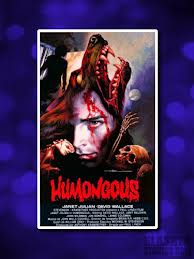
HUMONGOUS
Canada, 1982, 94 minutes, Colour.
Janet Julian, David Wallace.
Directed by Paul Lynch.
Humungous is a Canadian horror thriller. It is technically stylish - but is derivative in content.
The film opens with echoes of Halloween and Friday the 13th., with a party in 1946. A wealthy frigid girl is savagely raped and the rapist is attacked by savage dogs. There is a transition to the present by an excellent credits collage of photos of the girl and her family. The film then transfers to the routine Friday the 13th style - a group of glamorous (in this case actually some of them are models for commercials) teenagers aboard a yacht with their clashes, sexuality - and a fair amount of adolescent tedious behaviour. When they clash and their boat runs aground and bursts into flame they are cast on the island where the lady, now a very old woman, is alleged to live. Expectations are thwarted. Audiences would expect animal menace with the dogs pursuing the teenagers and killing them. The teenagers are killed - but the dogs are dead, the lady is dead and her retarded humungous son is the assailant. The film is exciting enough in its way, although contrived, and the teenagers are killed in the expected
manner. The hero goes, perhaps suddenly, towards the end - and the heroine, as usual, has her full effect of screaming and survives.
The film is a Canadian production and has great technical qualities which can be admired - even though we have seen the material many times before. Only an average example of the multiple-killing horror of the late 1970s early 1980s.
Published in Movie Reviews
Published in
Movie Reviews
Tagged under
Saturday, 18 September 2021 19:30
Human Factor, The
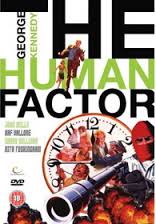
THE HUMAN FACTOR
UK, 1975, 96 minutes, Colour.
George Kennedy, John Mills, Raf Vallone, Arthur Franz, Barry Sullivan.
Directed by Edward Dmytryk.
The Human Factor ends with and endorses the Old Testament injunction of an eye for an eye justice and, while sitting through it, it is hard not to feel this strongly. Taking current terrorism, with its arbitrary choice of victims and
its heartless cruelty for a cause, the film shows George Kennedy, aided by John Mills, detecting the terrorists with alarming swiftness and accuracy by means of computers and Raf Vallone representing the law. But law and information do not
suffice and the human factor of pain, rage and a burning compulsion to execute justice takes over. A topical film, taking us behind so many current headlines, and posing distressing moral problems.
1. The significance of the title? Tone? Reference to the human factors of killing, psychology? Contrasts between computers and machines? The irony of the illustration of the human factor, that it was indicated by a computer?
2. The background of the 70's and international terrorism? The international themes, justice within this setting? The atmosphere of realism, suffering, exasperation of terrorists? The individual within society, at the mercy of society and its dangers? Man as victim? Justice and the administration of justice, the use of scriptural quotations on vengeance at the end?
3. The contribution of the international cast, the Americans, the English, the background of Italy, America, Europe? The universal value because of international themes, terrorism?
4. The Italian background, locations, contrast with America? Americans in Italy?
5. The impact of the initial massacre and the audience reaction to it? The way it was visualised, blood, wounds, death and slaughter? The hero's reaction as shared by the audience? Its impact for later massacres? As a justification of the hero's behaviour, revenge? Expectations of justice against administration?
6. Portrayal of the group involved? The backgrounds, international origins, social origins, political outlooks? Revolutionary? Guerrilla tactics? The techniques and style as presented in detail: advertising, the woman coming to the house, weapons?
7. Kinsdale within this context? His arriving home, impact of the massacre? The effect on his whole outlook on life, personality? His rage and the way this was portrayed? Audiences identifying with his suffering and rage? His involvement in the solution of the killing, its gradual obsession? What he should have done, in terms of the police, the political situation on NATO and America in Italy? George Kennedy as this kind of character, his build, look, age?
8. George Kennedy's style in the performance? The background of Kinsdale as an American, family, work? Involvement in computers? The irony of his involvement in war games and his becoming victim of a real-life war game? The film's oblique comments on NATO, defence, armaments, America and terrorists arising in this kind of situation?
9. His associates, John mills and his British style in his character? As a person, at work, helping Kinsdale, his phone calls, programming the computer, knowledge that it was against the rules? Janis and her role in NATO, as support to Kinsdale, apprehensions about what would happen? General Fuller and his relationship with his men? His disapproval of what happened? How well-delineated were these supporting characters to give the film interest, realism?
10. The film's background of computers? The machine factor and its role in modern life? The way that they are programmed, information? Kinsdale and his reliance on the computer for information? The quick ways in which information was supplied? McAlister? and his control of the computer? His asking the computer about the human factor?
11. How interesting were the aspects of the plot in Kinsdale checking out the results of the computer, interviewing people, discovering their innocence, the methods of his investigation? The time element, narrowing down his investigations?
12. The contribution of Admonds as a character for the film? Kinsdale's encounter with him, Edmond's presumptions about his identity, the drinking sequence and his sympathy for Kinsdale and his giving the information? His later being taken to task?
13. The portrayal of the Italian police in their ordinary work, involved with such slaughters, the international implications? Doctor Lupo as a person. his information, his decorum and protocol? Relationship with the CIA men? His encounters with Kinsdale and his underestimating of Kinsdale's resourcefulness, eg. in the identity card? The inevitability of clash with Kinsdale?
14. The portrait of Taylor, his background, motivations? The visualising of him in his surroundings? The second massacre? The importance of Kinsdale's saving the Gerardis? The suspense generated, Kinsdale's involvement in the violence?
16. The suspenseful build-up of Kinsdale narrowing on the terrorists, Mc Alister and the results of the test, decisions as to what is to be done? The involvement of Dr. Lupo?
17. The drama of the killing of Taylor, the confronting of the terrorists? The sequence with the pain in Kinsdale's hand?
18. The appropriateness of the supermarket for the place of the finale? The involvement of ordinary people, deadlines, machinery, the danger of ordinary people becoming victims? The atmosphere of the supermarket, the siege? The desperation of Kinsdale and his charge, audience's identifying with his executing the terrorists?
19. What kind of world did the film presuppose, present? How real a world of the 70's? The impact of the Biblical quotation at the end? Justified?
Published in Movie Reviews
Published in
Movie Reviews
Tagged under
Saturday, 18 September 2021 19:30
Hucksters, The

THE HUCKSTERS
US, 1947, 115 minutes, Black and white.
Clark Gable, Deborah Kerr, Ava Gardner, Sidney Greenstreet, Adolphe Menjou, Keenan Wynn, Edward Arnold.
Directed by Jack Conway.
The Hucksters is an enjoyable soap opera from the immediate post-war period. One of Clark Gable's earliest films after his military service, it also introduced Deborah Kerr to American films. The film has a strong cast, is directed by veteran Jack Conway. The original novel (more like later Peyton Place, Madison Avenue exposes) has been refined for Gable and Kerr. The film has become a satire on radio rather than advertising agencies. The heroine has become a dignified widow. On its level of popular romance and satire, the film works well as an undemanding entertainment. There is a particularly good performance by Sidney Greenstreet. The film is interesting historically as showing how clean-cut was the Dallas and Dynasty material in the '40s.
1. Popular entertainment? A piece of Americana? Clark Gable vehicle? The strong cast. M.G.M. treatment? The refining of a popular novel?
2. How well did the film work as romance, presentation of the business world, satire? Soap opera contents? The dignified M.G.M. 40s treatment? (In comparison with later soap operas and television series?)
3. The title and Vic's explanation of it? The world of advertising, selling? The capitalist values - and the satire and critique? The world of the huckster, the promoter, the travelling salesman?
4. Clark Gable as Vic - his war service. resuming life? The issues of the period as the returned soldiers looked for work in a new world? Deborah Kerr as a widow - her concern about surviving in the post-war world. advertising. money? The changed advertising world? New opportunities? Pretentiousness? The repercussions of the new era?
5. The character of Vic and Clark Gable's style? His background in advertising and radio. his war experience? His putting himself on the market? His buying the tie? His push in the office and persuasiveness? His interviewing Kimberley and pushing her into the advertising? His push with Evans? Persuading Kimberley? Kaye and the photo and his changing the image for the advertising,, his criticisms of the jingle etc.? His ability and push, diplomatic skill?
6. The advertising world: Kimberley and his anxiety,, his being a yes-man? Evans and the symbolic actions? Background., the pretentiousness of his style and everybody agreeing? Audience reaction to this advertising world - especially reaction to Evans?
7. Beautee Soap and the jingles? Vic's ad. and the response? Understanding advertising, the way it works, popular psychology? Selling processes?
8. Vic and his success. the dinner, the Kimberleys? Taking out Kaye? The proposal? The possibility of settling down? The fight with the firm? His going to California? Kaye's journey to California? Having to make decisions?
9. Kaye as the Deborah Kerr type? War experience? The children? Her being ahead of Vic as regards the money and the advertising? Her demure image in the advertising? The dinner? The new experience with that of the Kimberleys? The proposition? The clash? Her visiting California and the reconciliation? Soap opera material - but well-acted?
10. Jean and her work, song, flirting, the new job, friendship with Vic? Ava Gardner's style?
11. Kimberley and his nervousness. drinking, background in advertising? His forgetting about the dinner arrangement? His wife's comments on the situation? The dinner and his sad story? His wanting to assert himself before it was too late?
12. Evans and his Board. the meeting. his demonstrations and actions. his final teasing of Vic and Vic's response, abusing him? The audience agreeing with Vic?
13. The final assessment of his situation by Vic,, his future in the business world? Relationship with Kaye?
14. An entertaining adaptation of a big novel to the screen? The watering down of the tougher original novel?
Published in Movie Reviews
Published in
Movie Reviews
Tagged under
Saturday, 18 September 2021 19:30
Her Twelve Men
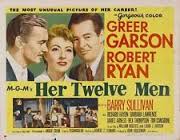
HER TWELVE MEN
US, 1954, 91 minutes, Colour.
Greer Garson, Robert Ryan, Richard Haydn, Barry Sullivan.
Directed by Robert Z. Leonard.
Her Twelve Men was one of Greer Garson's last films at M.G.M. She had made an impact with Goodbye, Mr. Chips in 1939 and until 1950, made a significant number of successful films. She won her Oscar for Mrs. Miniver. This film has the atmosphere of Goodbye, Mr. Chips updated to the United States. It is slight, romantic, optimistic, pleasant. It enables Greer Garson to do pleasantly the things she did well. Robert Ryan is restrained as the leading man. The film is in the vein of such later films as To Sir with Love. Her director was Robert Z. Leonard who directed her in a successful film, Pride and Prejudice.
1. Greer Garson's popularity and style in Hollywood? The film as a Greer Garson vehicle? Entertainment for its time? Now?
2. The tradition of Hollywood films on schools? The focus on the teachers, students, relationships? Sentiment? Optimism? The atmosphere of Goodbye, Mr. Chips? A blending of realism and feeling?
3. How stereotyped the characters, situations? Ordinary expectations fulfilled? The ironic touches to the screenplay? The dialogue?
4. The contrived introduction to Jan: her dreams, the glamorous pictures of Greer Garson? The contrast with her being in the plane, the discussion with the boy on the plane, her arrival, the clash with Joe Hargraves? Meeting Mr. Barrett? The philosophy of the school? Her telling her life story to Joe? The background of her marriage, husband's death, hopes to achieve something? Sufficient basis for a schoolteacher?
5. The boys' reaction on the plane, calling her a creep, the calling her 'Sir' throughout the film? Meeting the boys, the homesick crises on the first night? The lesson, the 500 lines, Hargraves and his advice, ad~ visaing playing it by ear? The friendship of the sports coach? The riding sequences? The pet dog and the threat of resignation? Dick Oliver and his antagonism, the sprinklers incident, the clash with Mr. Barrett, the piano recital of the boy for his mother and her new husband? The film's attention to details of her way of life? Her changing throughout the school year?
6. The professional work of teaching, dedication, work, reward? Human contact?
7. The lonely children, the mother at the Riviera and Jan writing letters? Oliver and his business interests, his antagonistic boy? The boy with the piano playing and his fear of his mother and the expectations? Coping with the various clashes? Going with Dick Oliver to Texas? Leaving the twelve to help the one?
8. The portrait of Hargraves - ordinary teacher, slow and ironic, wise? His girlfriend? The clashes with Jan? Advice, help?
9. The build-up to the happy endings - the possibility of Jan going with Oliver, her decision to stay at the school? The expected happy ending?
10. How entertaining within its contrived limits? An enjoyable picture of school life - ideals, possibilities?
Published in Movie Reviews
Published in
Movie Reviews
Tagged under
Saturday, 18 September 2021 19:30
Highpoint
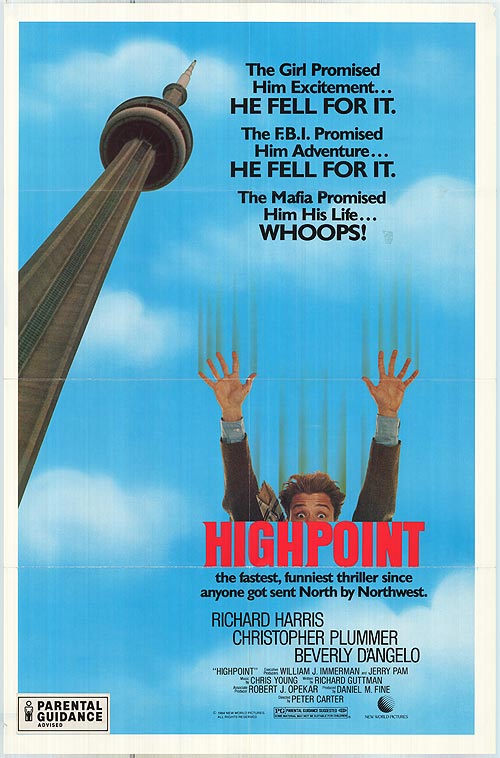
HIGHPOINT
Canada, 1979, 86 minutes, Colour.
Richard Harris, Christopher Plummer, Beverley D'Angelo, Kate Reid, Saul Rubinek, Robin Gammel, Peter Donat.
Directed by Peter Carter.
Highpoint is one of numerous American- Canadian co-productions, made because of tax advantages in Canada. These films, while very popular entertainment -at the widest level, have done little credit for the Canadian film industry. These films are generally routine entertainments decked out with international stars, often Canadian citizens like Christopher Plummer.
This film was directed by Peter Carter, a Canadian director of a number of films (Klondike Fever with Angie Dickinson and Rod Steiger). It has Los Angeles locations as well as Quebec and Toronto settings.
The film is a tongue-in-cheek private eye style thriller. It is meant to be humorous (with jokes about the universal jurisdiction of the CIA). However, it comes across as corny rather than as genuinely humorous. It is a convoluted chase thriller about American money, the CIA, Mafia types and a playboy criminal pursued by a would-be accountant with a Cockney accent and the criminal's attractive sister and mother. There are also some comic criminals. There are chases, spectacular stunts, shoot-outs. The culmination is a literal kind of cliff-hanger with villain Christopher Plummer hanging from a highpoint tower in Toronto.
Richard Harris seems to enjoy himself with the voice-over technique of the private eye thriller and the involvement of an accountant in international money dealings and espionage. Beverley D'Angelo is decorative as the sister. Christopher Plummer does one of his callous villains - almost without trying. Kate Reid has some moments as his mother. Comedian Saul Rubinek is one of the two comic criminals.
The film is little more than an episode of a television series - international crime, callous criminals, romantic adventurers.
It adds little to the careers of its stars - but is indicative of a number of films made by Canada during the '70s and '80s.
Published in Movie Reviews
Published in
Movie Reviews
Tagged under
Saturday, 18 September 2021 19:30
Highly Dangerous

HIGHLY DANGEROUS
UK, 1950, 88 minutes, Black and white.
Margaret Lockwood, Dane Clark, Marius Goring, Wilfred Hyde White, Michael Hordern, Naunton Wayne.
Directed by Roy Ward Baker.
Highly Dangerous is a pleasant, if routine, thriller from Britain in the early '50s. The script is by espionage write Eric Ambler. Direction is by Roy Baker, director of a number of thrillers at the time (including American films Inferno, Don't Bother to Knock). He later directed a number of horror films. Margaret Lockwood is the intrepid heroine, Dane Clark the laconic American hero. There is a very good supporting cast including Marius Goring, Michael Hordern and Wilfred Hyde White. The film reflects the cold war atmosphere of the early '50s.
1. An entertaining thriller? Espionage? Action? Comic touches?
2. Black and white photography, European locations, editing and pace? The score by Richard Adinsall?
3. The atmosphere of the cold war, tension in Europe, the Iron Curtain? In retrospect?
4. Bacteriological warfare, the use of weapons, cold war tension? The information about this kind of warfare, its potential danger? The role of scientists?
5. The action adventure with the comic touch? The Dick Barton radio programme and its influence on Frances? A radio programme heroine?
6. Frances and her work, her understanding of insects, the commissioning to go to the Balkans? The danger. of her mission? The trip, contacting the agent, his death? The encounter with Bill Casey? her being captured, the truth drug, her becoming the heroine of a radio programme? The extent of her plans, the decision to steal the insects? The dangers, help from Bill? The help from the priest? The escape? Romance and adventure?
7. Bill the American in the Balkans, journalist, the encounters with Frances, friendliness, being caught into her plans, helping her, dangers, heroics?
8. The picture of the authorities, the director of the institute? The sinister background of the Balkans and enemy powers?
9. The world of agents, deaths? The priest and his help?
10. Fifties espionage, British style?
Published in Movie Reviews
Published in
Movie Reviews
Tagged under
Saturday, 18 September 2021 19:30
High Wind in Jamaica, A
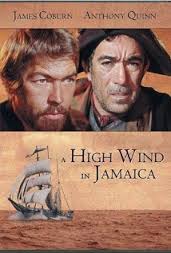
A HIGH WIND IN JAMAICA
UK, 1965, 103 Minutes, Colour.
Anthony Quinn, James Coburn, Benito Carruthers, Lila Kedrova, Kenneth J. Warren, Nigel Davenport.
Directed by Alexander Mackendrick.
A High Wind in Jamaica is engaging pirate material. Directed by the Scottish Alexander Mackendrick who had done very well with Whisky Galore and The Man in the White Suit and The Ladykillers amongst other films in England in the 40s and 50s, had had a mixed career in Hollywood. He made The Sweet Smell of Success in 1957, a very effective satire on big business. He made The Odd Don't Make Waves in 1967. In the meantime he created this period pirate adventure where the focus is on the children who are captured by the pirates and the effect that they have on the pirates. Anthony Quinn and James Coburn work well together as the pirates. It is an exciting period piece of adventure.
1. The quality of this pirate adventure? As a fable?
2. The importance of colour, Cinemascope, sea spectacle, period costumes and sets?
3. How credible was the basic plot, the characterization? Was this important for the ultimate themes?
4. The opening with the hurricane, the plight of the family, the reactions of the children, Emily especially and her searching for the cat? How did this prepare us for the action adventure and the way the children would behave?
5. What did we learn of the children and their background from seeing their parents? The children well behaved? Their going on the voyage and going back to England? What did audiences expect of them during the voyage? How was this fulfilled, not fulfilled?
6. The atmosphere of adventure in the capture of the ship by the pirates, atmosphere, violence? The first impressions of Captain Chavez and the pirates?
7. What kind of man was Chavez? Why was he a pirate? His motivations, his greed? His relationship with Zac, with the rest of the crew? His interrogations, torture, use of violence, even threatening the lives of the children for the sake of getting information? The search for the money and the Captain's ultimate capitulation? The fact that Chavez was growing old in his pirate's life? Was he prepared for the encounter with the children?
8. How shrewd a character was Zac? Why was he a pirate, his friendship with Chavez, loyalty and advice? His handling of the crew, his attitudes towards the children?
9. How interesting were the children in themselves? Did the film clearly delineate their characters? The elder girl, Emily, John and the other boys? Their attitude towards their captivity? Their fear, their fearlessness? Their seeing it in some ways as a game? Their reaction to the shooting, telling off the pirates in an innocent, childlike way etc.? Emily and her impact on the crew?
10. The contrast with their behaviour in the town? The life of the 19th century West Indies town, people, behaviour, moral attitudes? The madam and her greed? The police? The accident of John's death and everybody's reaction to it?
11. The details of the children's behaviour in the town, eg. Emily going to post the letter etc.?
12. The importance of Emily's illness, the effect on Chavez, the effect on Zac, the rest of the crew? Chavez ready to sacrifice safety for the sake of the sick child? What had happened to him?
13. The repetition of adventure in the attack on the Dutch ship? The violence and confusion? Emily's illness and her fear, her killing of the Dutch captain? Audience response to this violence in the children? The effect on the other children?
14. The quick cutting to the trial? The effect on the children, especially Emily and her inability to repeat what had happened? The effect on the pirates? The reaction of the parents? The investigator and the details of his interrogation?
15. Did the audience expect the condemnation and the hanging? Zac's reaction, Chavez's acceptance of guilt for some crime?
16. How ironic was the final sequence: the death of the pirates not visualized, the children playing as normal? The impact of this on the audience and the highlighting of the themes?
17. How did the film use the action adventure for an understanding of human nature, behaviour, and the nature of children?
Published in Movie Reviews
Published in
Movie Reviews
Tagged under